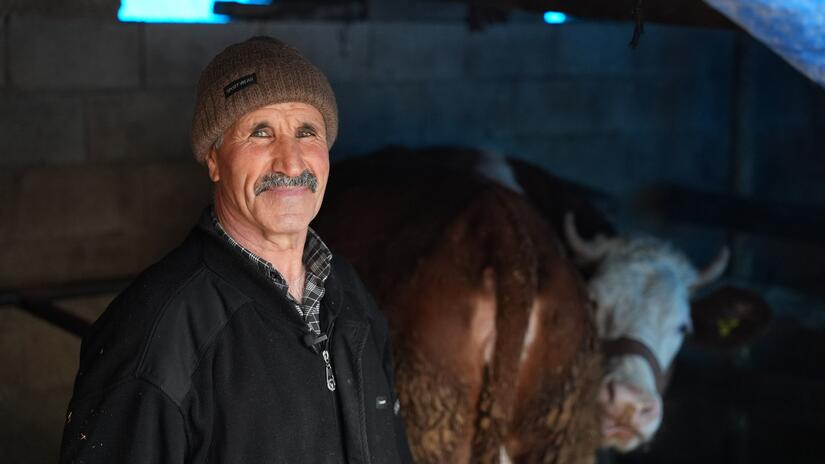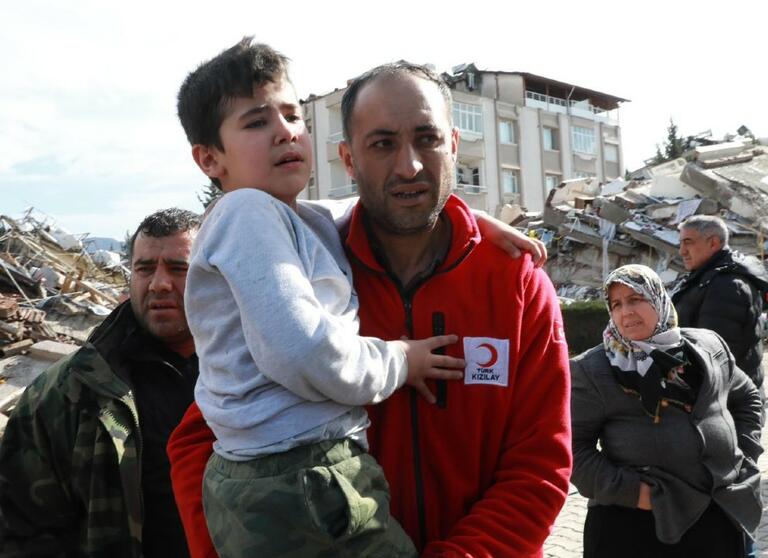Before the devastating earthquakes that shook Türkiye on 6 February, 2023, Döndü Karabörk made a good living by operating a glassware store in Kahramanmaraş province.
But then came the earthquakes.
By the time the ground stopped shaking, the glassware store — and most of the delicate objects inside — were destroyed. Everything she had worked for seemed to be completely and permanently shattered.
“We were about to restart working, but we didn't have capital,” she recalls. “I was feeling down.”
Fortunately, Döndü had a chance to put the pieces of her business back together.
With support from the Turkish Red Crescent and the International Federation of Red Cross and Red Crescent Societies (IFRC), Döndü received a cash grant that she used to buy the products needed to reopen and revive her shop.
"That grant of 30,000 Turkish Lira (CHF 1,000) was very precious to us,” she says. “It was the reason I was able to take my first step back up again."
Döndü was later granted another TRY 15,000 (CHF 500) for additional livelihood support. “We went shopping again to buy more products,” she recalls. “Now I'll be able to work more comfortably. Even though the support was small, it was still a very big push for me.”
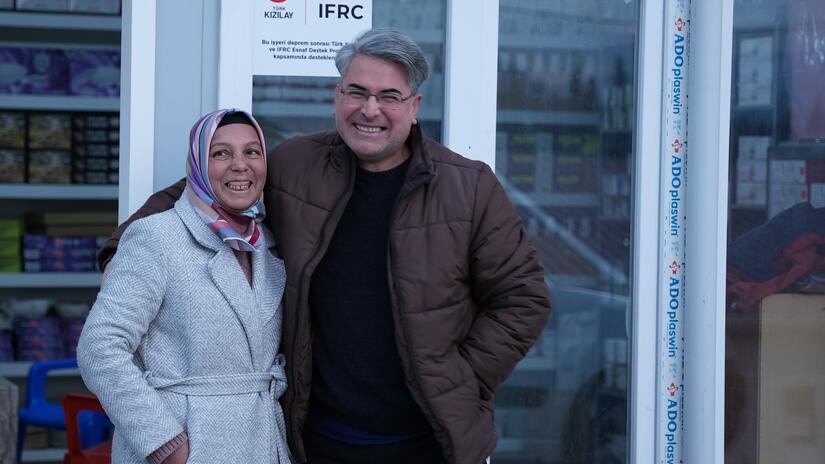
Döndü and Yavuz stand in front of her glassworks business, which was almost completely destroyed by the February 2023 earthquakes. Small grants from the IFRC and Turkish Red Crescent have helped her rebuild her business.
Photo: Onur Işık Cantürk/IFRC
Rebuilding together
Döndü’s story is far from unique. The earthquakes not only caused widespread destruction — claiming over 55,000 lives, and displacing millions of people — it also destroyed thousands of businesses. Many thousands of people lost their only means of earning income.
In a region where agriculture, farming, and labor make up a significant portion of the economy, the impact was particularly severe, affecting over 25 percent of the population. Since then, people have been in the process of rebuilding their lives, a journey that will take several years.
The Turkish Red Crescent and the IFRC have been at the forefront of earthquake-response efforts, which have included financial support to help people meet their immediate needs as well as their long-term, livelihood-recovery goals. This support includes grants for micro and small enterprises, rehabilitation of livestock and agricultural areas, and the repair of damaged infrastructure.
The IFRC launched an Emergency Appeal for Türkiye in the immediate aftermath of the earthquakes in order to raise CHF 400 million to support people's immediate and long-term needs. Thanks to contributions from numerous donors, recovery support is being provided so that the affected people can get back on their feet.
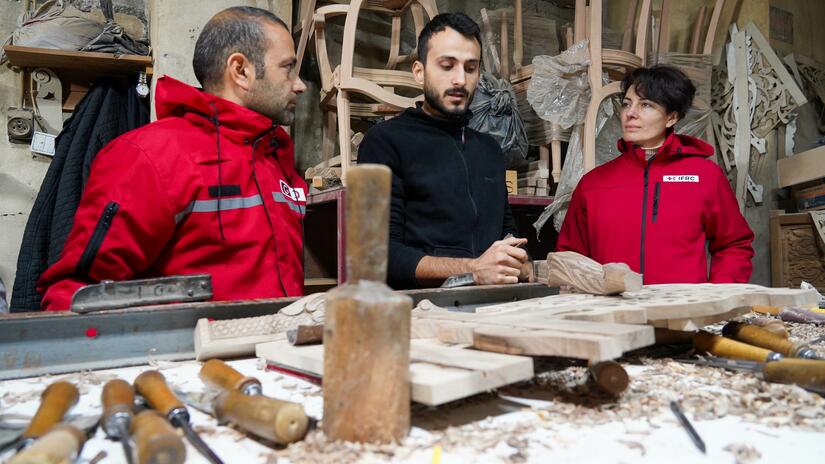
A team from the Turkish Red Crescent and the IFRC looks on as carpenter Ökkeş İnce stands in front of his workbench, which is covered with wood and woodworking tools. İnce’s house and workshop in Kahramanmaraş were badly damaged during the earthquake.
Photo: Özgür Altınay/Turkish Red Crescent
From farmers to craftspeople
The first phase of the plan supported 607 micro and small enterprises from November 2023 until early 2024. This included craftspeople and artists, with an average cash transfer of TRY 40,000 (CHF 1,300) per person. The livelihoods recovery support has just entered its second phase and will continue until February 2025.
“We went through a challenging period both mentally and financially,” said Ökkeş İnce, a carpenter whose house and workshop in Kahramanmaraş were badly damaged. “It was very tough. But we couldn't leave this place.”
"I said, ‘Life goes on,’ and started rebuilding our life. We cleared the debris in our workshop and started trying to repair it.”
Ökkeş specializes in handcrafted wood carving, producing furniture and accessories. He used the cash grant to purchase the machinery and equipment needed to revitalize his business.
Taking care of the land
Meanwhile, cash transfers from the Turkish Red Crescent and the IFRC have helped more than 860 agricultural and livestock farmers who received payments in two installments. Each person received an average of TRY 30,000 (CHF 1,000).
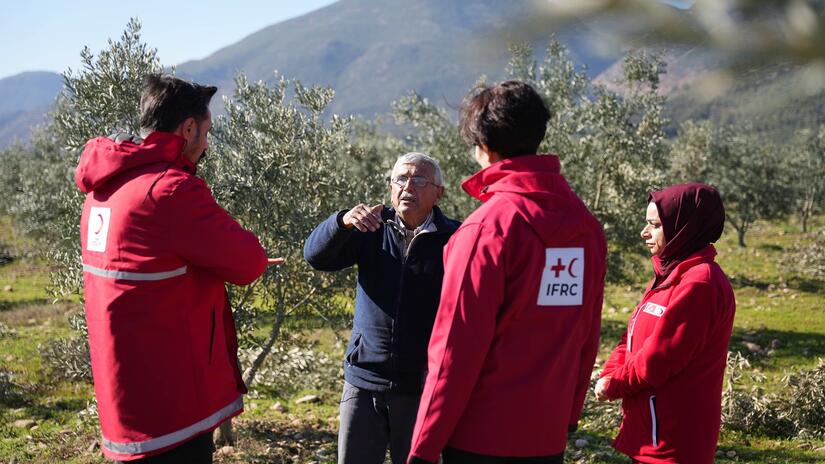
Ali Öztürk, a farmer from Gaziantep province, stands in his olive orchard with members of the Turkish Red Crescent and the IFRC.
Photo: Onur Işık Cantürk/IFRC
“After the earthquakes, I did not give up. I continued to take care of my land,” said Ali Öztürk, a farmer from Gaziantep province.
Ali’s barn collapsed before his eyes during the earthquakes and his tractor was destroyed. Despite the challenges, he remained determined to continue farming. With the livelihoods cash grant, he purchased agricultural supplies to maintain his olive and grape crops.
“The Turkish Red Crescent and the IFRC provided me with cash support twice," he said. "I first bought fertilizers that I used in the field, then I bought pesticides.”
Ali underlines that he still needs financial aid to put his business back on track because he is having difficulty buying some basic items, such as agricultural pesticides. “Buying diesel is what puts us in trouble,” he says.
A positive impact
A study conducted among earthquake survivors, who were supported in the first phase, revealed the positive impact of Livelihood Recovery Programme. A majority of participants expressed satisfaction with the support received.
According to the study, cash assistance was highly preferred over in-kind assistance because people were able to choose for themselves the kind of materials and supplies they needed most. Almost all of those involved say they used the money to purchase equipment, raw materials or machinery. Among farmers, 79 percent reported positive changes in their businesses and operations. For micro and small enterprises, that figure 90 percent.
However, the study also highlighted that some recipients felt the amount of cash was insufficient to fully meet their needs, underscoring the necessity for expanded interventions in the upcoming phase.
In the second phase of the programme, the Turkish Red Crescent and the IFRC are looking to assist 4,000 micro and small enterprises and 2,000 farmers. Highly vulnerable women micro and small enterprises and young micro and small enterprises aged 18-30 will receive TRY 80,000 (CHF 2,219), those in the manufacturing/production sector will receive TRY 70,000 (CHF 1,941), and those in the retail/service sectors will receive TRY 50,000 (CHF 1,386),

